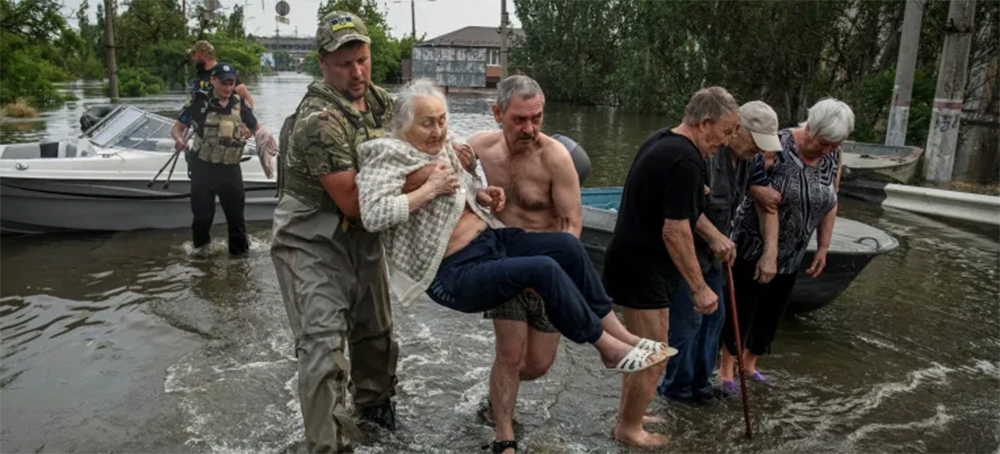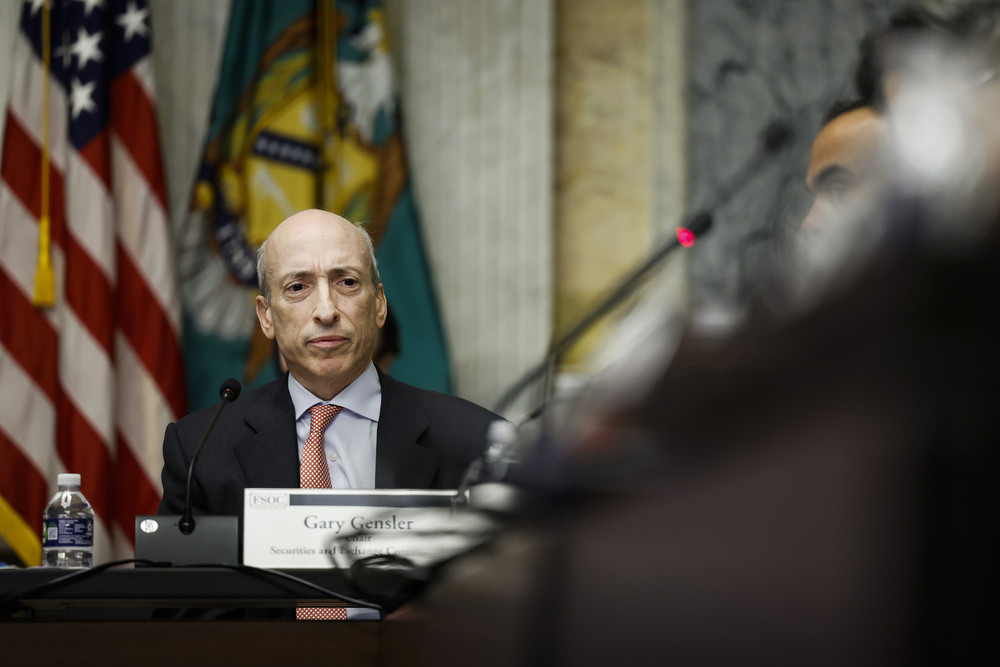
12 June 23
Live on the homepage now!
Reader Supported News
HOW IN BLUE BLAZES DO WE GET YOU TO DONATE? — We have what amounts to a handful of dedicated community members who sustain Reader Supported News. The rest come here, trust us, but will not contribute. Please get over that and join the supporters. Seriously.
Marc Ash • Founder, Reader Supported News
Sure, I'll make a donation!

Trump Supporters’ Violent Rhetoric in His Defense Disturbs Experts
Michael S. Schmidt, Alan Feuer, Maggie Haberman and Adam Goldman, The New York Times
Excerpt: "The former president’s allies have portrayed the indictment as an act of war and called for retribution, which political violence experts say increases the risk of action."
The former president’s allies have portrayed the indictment as an act of war and called for retribution, which political violence experts say increases the risk of action.
The federal indictment of former President Donald J. Trump has unleashed a wave of calls by his supporters for violence and an uprising to defend him, disturbing observers and raising concerns of a dangerous atmosphere ahead of his court appearance in Miami on Tuesday.
In social media posts and public remarks, close allies of Mr. Trump — including a member of Congress — have portrayed the indictment as an act of war, called for retribution and highlighted the fact that much of his base carries weapons. The allies have painted Mr. Trump as a victim of a weaponized Justice Department controlled by President Biden, his potential opponent in the 2024 election.
The calls to action and threats have been amplified on right-wing media sites and have been met by supportive responses from social media users and cheers from crowds, who have become conditioned over several years by Mr. Trump and his allies to see any efforts to hold him accountable as assaults against him.
READ MORE
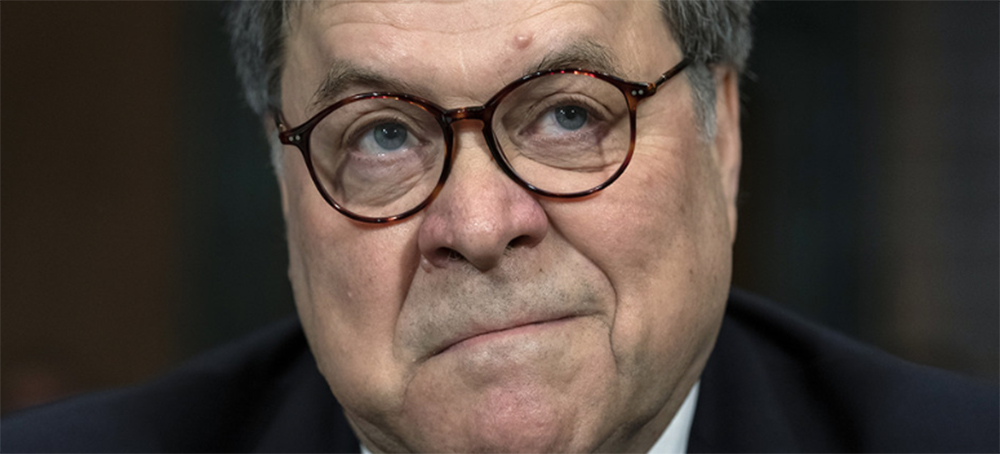 Then Attorney General Bill Barr appears before the Senate Judiciary Committee on May 1, 2019, on Capitol Hill in Washington. (photo: J. Scott Applewhite/AP)
Then Attorney General Bill Barr appears before the Senate Judiciary Committee on May 1, 2019, on Capitol Hill in Washington. (photo: J. Scott Applewhite/AP)
Trump Attacks 'Gutless Pig' Bill Barr for Calling His Indictment 'Very Damning'
Peter Wade, Rolling Stone
Wade writes: "Donald Trump attacked his former attorney general Bill Barr after Barr said Trump is 'toast' if 'even half' of the 37-count indictment against him is true."
"Barr’s doing it because he hates 'TRUMP' for firing him"
Donald Trump attacked his former attorney general Bill Barr after Barr said Trump is “toast” if “even half” of the 37-count indictment against him is true.
“It’s a very detailed indictment, and it’s very, very damning,” Barr said on Fox News Sunday.
Those comments unleashed a barrage of insults from Trump, including “gutless,” “coward,” “weak,” “lazy,” “a mistake,” “low life,” “a very unpatriotic person” and “very, very bad for the country.”
On Truth Social, Trump called his former attorney general a “gutless pig” as well as a “‘disgruntled former employee’ … lazy Attorney General who was weak … totally ineffective.”
Trump continued his tirade against Barr during an interview with Roger Stone on Sunday afternoon. “This thing is a disgrace,” Trump said, referring to the indictment that alleges Trump violated the Espionage Act by storing highly classified government documents in a bathroom and other insecure areas of his Mar-a-Lago resort. “Virtually everybody other than a low life like Bill Barr, who as you know I terminated cause he was gutless, he wouldn’t do what he was supposed to do. Everybody says this is a disgraceful indictment. It shouldn’t happen. It was done for political reasons.”
Barr stepped down as Trump’s attorney general after he refused to stand behind the then-president’s claims that the 2020 presidential election was rigged.
Later in the interview, Stone asked Trump, “Is Bill Barr part of the deep state and the cover-up of the Biden allegations?” Stone then alleged that Barr tried to bury the investigation into the Bidens while he was attorney general.
“I think he’s a coward who didn’t do his job,” Trump said. “He was desperately afraid of being impeached… I said, ‘I got impeached twice and my poll numbers went up, not so bad.’ But unfortunately, he was a coward, and we had to live with that… Bill Barr was a mistake. Too bad, but he was a mistake, but you’ll have some of them… He’s certainly friendly with some bad people.”
Trump also called Barr a “very unpatriotic person” and “very, very bad for the country.”
Later in the interview, Trump’s attacks against Barr became extremely personal when the former president attacked Barr’s size.
“Russia, Russia, Russia, Ukraine, impeachment hoax one, impeachment hoax two, the fake dossier, spying on the campaign, these are very dishonest, very corrupt people,” Trump said. “But Bill Barr, I think he’s more weak than anything else. Now he goes and he sits down, if they can find a chair for him, because it’s not that easy, and he just bloviates. It’s disgraceful. It’s so, it’s actually unpatriotic and so bad for our country. He’s got a lot of hatred. I fired him for just not doing his job.”
READ MORE
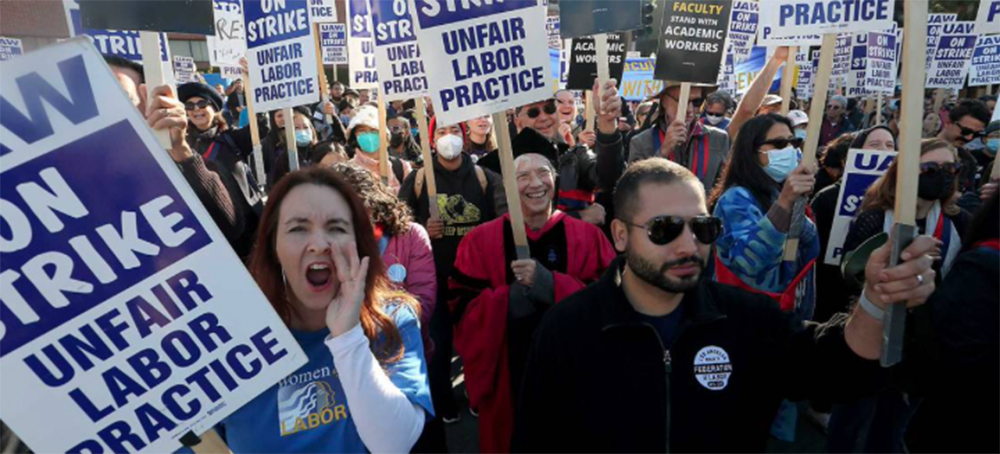 Striking University of California academic workers and faculty gather at UCLA, where the UC Board of Regents met on Dec. 14, 2022. The union members are demanding better pay and benefits. (photo: Luis Sinco/LA Times)
Striking University of California academic workers and faculty gather at UCLA, where the UC Board of Regents met on Dec. 14, 2022. The union members are demanding better pay and benefits. (photo: Luis Sinco/LA Times)
Erwin Chemerinsky | Supreme Court Deals Serious Blow to American Workers’ Right to Strike
Erwin Chemerinsky, The Sacramento Bee
Chemerinsky writes: "The Supreme Court recently took a major step to weaken a basic protection of workers guaranteed by federal law: the right to strike."
The Supreme Court recently took a major step to weaken a basic protection of workers guaranteed by federal law: the right to strike.
On June 1, 2023, in Glacier Northwest, Inc. v. International Brotherhood of Teamsters Local No. 174, the court ruled that a union could be sued and held for the economic consequences of a strike when they are “foreseeable, aggravated and imminent.” Yet all strikes impose economic costs on employers — that is why they are effective — and it’s unclear what, exactly, will meet the court’s vague standard.
The case arose when drivers of cement trucks went on strike. Although they reported for work that day, they went on strike at the appointed hour and returned the trucks with the cement mixers turning. The cement within the vehicles was ruined, though the trucks were not damaged. The cement company sued the union for money damages for the cost of the lost cement. The Washington State Supreme Court ruled in favor of the union, holding that federal law barred their being held liable for the incidental costs attendant to a strike.
The U.S. Supreme Court, in an 8-1 decision, reversed this ruling and said the union could be held liable for these costs. Justice Amy Coney Barrett wrote the opinion for the majority, and only Justice Ketanji Brown Jackson dissented. One of the mysteries of the case is why the other liberal justices, Sonia Sotomayor and Elena Kagan, did not join this powerful dissent.
The National Labor Relations Act protects the right of workers to strike. It has long been recognized that strikes are an essential tool for employees to bargain effectively and protect themselves. For this reason, the Supreme Court has long held that unions generally cannot be held liable for the economic consequences of their strikes.
The union did not give advance notice of their strike to the company. But federal law is clear that only health care workers are required to let employers know in advance of a strike.
To be sure, unions have no right to intentionally destroy the property of employers. A striking union cannot set an employer’s building on fire or throw bricks through windows. But nor can the union be held economically responsible because the employer loses money during the strike and others suffer. For example, the current strike by writers in Hollywood is costing networks and studios a large amount of money, and many who serve that industry are suffering economically. The law, though, has been clear that the union cannot be held liable for these costs; otherwise, strikes would be economically impossible.
Admittedly, there is a line to be drawn. For over a half century, the Supreme Court has ruled that this line is initially to be decided by the National Labor Relations Board, not the courts. The NLRB was created by Congress to be the experts in this area and to decide when a strike is protected by federal law. In fact, there is a proceeding pending before the NLRB concerning the strike by the cement workers against Glacier Northwest.
But the Supreme Court’s decision means that it’s now for the courts, not the NLRB, to decide this question, and the court recently ruled that the union could be held liable because the loss of cement met its test.
The problem is the vagueness of an “imminent” and “foreseeable” loss. It’s unclear how to distinguish ruined cement from the economic loss Glacier Northwest would have suffered if the workers never showed up serious for work that day. Or what of those engaged in construction who suffered losses because the cement never arrived on account of the strike? These losses, too, seem imminent and foreseeable.
The problem with such a vague standard is that employees and unions will not be able to know in advance what might cause them to be held liable and face damage suits. This inevitably will chill the exercise of their federally guaranteed right to strike.
Employees have relatively few tools that they can use to pressure employers to provide better wages and working conditions. It is why the right to strike is so important. Unfortunately, the Supreme Court has dealt it a serious blow in its decision in Glacier Northwest.
READ MORE
 Ukrainian servicemen drive a tank on a road near the frontline in Donetsk Oblast on June 5. (photo: AFP)
Ukrainian servicemen drive a tank on a road near the frontline in Donetsk Oblast on June 5. (photo: AFP)
Ukraine War Latest: Ukraine Liberates at Least 3 Settlements in Donetsk Oblast
Alexander Khrebet, The Kyiv Independent
Khrebet writes: "As the counteroffensive continues, Ukrainian forces have reported the liberation of three settlements in eastern Donetsk Oblast."
Key developments on June 11:
- Ukraine liberates 3 villages, makes progress in Donetsk Oblast
- Russian troops attack evacuation boat, killing 3, injuring 23 in Kherson Oblast
- Water level drops in Kherson Oblast after Kakhovka Dam disaster
- Russian forces blow smaller dam in Donetsk Oblast
- Ukraine returns 95 prisoners of war from Russian captivity
As the counteroffensive continues, Ukrainian forces have reported the liberation of three settlements in eastern Donetsk Oblast.
The military said the villages of Blahodatne, Neskuchne, and Makarivka were liberated, while Ukrainian forces also continued to storm the Russian position near the Russian-occupied cities of Donetsk and Bakhmut.
The 7th Motorized Infantry Battalion of Ukraine's 129th Territorial Defense Brigade reported on June 11 that they liberated the village of Neskuchne on June 10.
The announcement comes the same day the 68th separate Jaeger brigade reported on June 11 liberating the neighboring Blahodatne village and a day after President Volodymyr Zelensky said that the much-anticipated Ukrainian counteroffensive against Russian forces was already ongoing.
In addition, the Deputy Defense Minister reported that the Ukrainian forces liberated the village of Makarivka.
All three liberated settlements are located just south of Velyka Novosilka, alongside the Mokri Yaly River.
Valeriy Shershen, the military spokesperson, said on June 11 that the Russian forces blew up a small dam on the Mokri Yaly River, causing flooding on both banks in an attempt to slow down the Ukrainian counteroffensive.
"This (the dam explosion and flooding) does not affect the counteroffensive actions," the spokesperson told Ukrainska Pravda media outlet, adding that the Ukrainian forces are now moving towards the village of Urozhaine, down the Mokri Yaly River.
In addition, Deputy Defense Minister Maliar also reported that the Ukrainian forces have advanced by 250 meters near the Berkhove Reservoir area near Bakhmut in Donetsk Oblast, while on the southern front, the army advanced in two directions from 300 to 1,500 meters.
The General Staff of Ukraine's Armed Forces also reported on June 11 that the 59th Motorized Brigade reclaimed a Russian position near the front-line town of Avdiivka in Donetsk Oblast.
The industrial city of Avdiivka, located five kilometers north of Russian-occupied Donetsk, has been a target of Russian attacks since 2014, when Russia first invaded Ukraine.
"(We) liberated Kherson, we'll liberate Donetsk," the 59th brigade said.
Donetsk, the major city in Donbas, has been under Russian occupation since 2014, when Russia first invaded Ukraine.
Russia attacks evacuees
Russian troops have attacked an evacuation boat in a flooded area in Kherson Oblast, killing three and injuring 23 people, the Prosecutor General's Office reported on June 11.
The number of casualties is being updated, according to the report.
The deliberate killing of civilians at any time and in any place breaches the Geneva Conventions and constitutes a war crime.
The prosecutors opened an investigation into violations of the laws and customs of war.
According to Governor Oleksandr Prokudin, the people were being evacuated from the Russian-occupied east bank to the Ukrainian-controlled side of the Dnipro River when the attack occurred.
The governor earlier said a 74-year-old man was killed while covering a woman with his body as Russian forces opened fire, shooting him in the back.
Dozens of settlements on both sides of the Dnipro River are flooded after the June 6 Kakhovka Dam explosion.
Ukraine accuses Russian forces of deliberately destroying the Kakhovka Dam, resulting in extensive flooding of numerous settlements along the banks of the Dnipro River.
Intercepted communications between Russian soldiers on June 9 allegedly implicate Moscow's involvement.
Interior Minister Ihor Klymenko, who is responsible for the evacuation of the civilians and animals from the flooded areas, said on June 11 that 2,718 people had been evacuated from Kherson Oblast.
Five people were reported dead, and 35 are still considered missing, including seven children, the minister said.
In Kherson Oblast, 46 settlements are still flooded, including 32 on the Ukrainian-controlled west bank and 14 on the Russian-occupied east bank.
In neighboring Mykolaiv Oblast, 31 settlements were flooded, while one person was reported dead due to flooding.
The rescuers evacuated 982 people from the region, according to the report.
The total number of casualties isn't known in the east bank, which Russian forces are currently occupying.
Meanwhile, the total flooded area in Kherson Oblast after the Kakhovka Dam disaster has nearly halved, decreasing from 139 to 77.8 square kilometers, the regional governor reported on June 11.
The average water level has dropped to 4 meters, according to the report.
On June 10, the water receded from three villages - Mykolaivka, Lvove, and Olhivka, the Kherson Oblast Military Administration reported on June 11.
The roads between the villages are gradually drying up, but not all of them are usable yet, according to the report.
POWs return home
President's Office Head Andriy Yermak reported on June 11 that 95 Ukrainian prisoners of war had returned home from Russian captivity as part of another prisoner swap.
Defenders of Mariupol, Chornobyl, Snake Island, and Bakhmut, including officers from the ranks of the Armed Forces, the National Guard, and the State Border Guard Service, are among the returned POWs.
Some of them were wounded in Russian captivity, according to the report.
Ukraine has managed to return over 2,500 Ukrainian POWs.
The recent POWs swap on May 25 brought home 106 Ukrainian POWs from Russian captivity.
"All our people will be returned home. Working on it further," Yermak said on June 11.
READ MORE
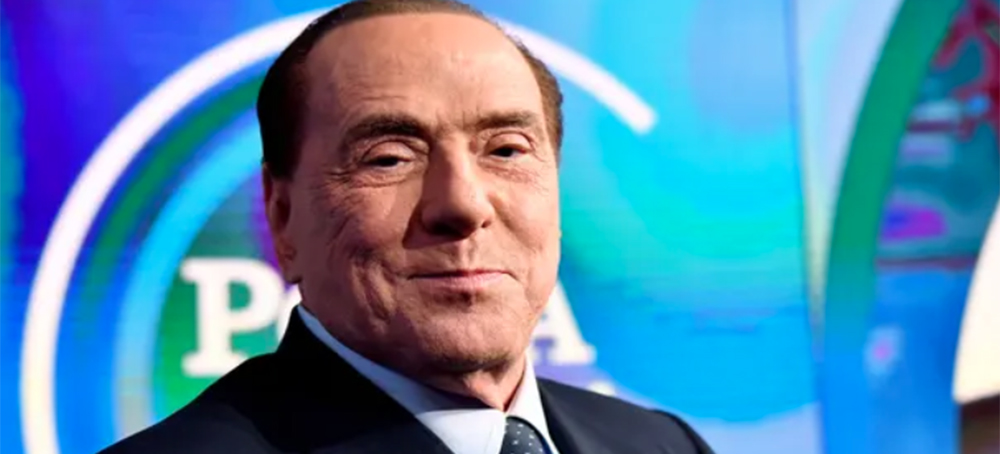 Silvio Berlusconi on the set of TV show Porta a Porta on Rai 1, in Rome, 2018. (photo: Alberto Pizzoli/AFP)
Silvio Berlusconi on the set of TV show Porta a Porta on Rai 1, in Rome, 2018. (photo: Alberto Pizzoli/AFP)
Paolo Gerbaudo | Silvio Berlusconi May Be Gone, but Trump’s Still Here. The Rotten Populist Legacy Is Everywhere
Paolo Gerbaudo, Guardian UK
Gerbaudo writes: "When he hurriedly left the prime minister’s official residence, Palazzo Chigi, for the last time on 16 November 2011, Silvio Berlusconi looked like a humiliated man."
The former Italian PM, who combined celebrity antics with rightwing populism, laid the groundwork for Trumpism
When he hurriedly left the prime minister’s official residence, Palazzo Chigi, for the last time on 16 November 2011, Silvio Berlusconi looked like a humiliated man. Italy’s finances were in trouble, with international investors betting against the country’s treasury bonds; prosecutors were on his heels due to the infamous “bunga bunga” scandal, which involved an underage sex worker; European allies Nicolas Sarkozy and Angela Merkel had made their displeasure with him public. Few would have guessed at the time how much future politics would follow Berlusconi’s populist template.
Berlusconi has died at 86 – he had been in hospital in Milan, undergoing treatment for a lung infection. Yet look around, and you can see his legacy everywhere. In fact, the years that followed Berlusconi’s exit from office vindicated his political style, which combined extreme personality politics, a skilful use of visual media and an unashamed demagogy – all to tap into voters’ disillusionment and cynicism about the status quo. It is hard to think of another politician more prefigurative of politics to come.
Many rightwing populist politicians who were dominant in the 2010s have been compared to Berlusconi, the first among them former US president Donald Trump. Like Trump and well before him, Berlusconi insisted on the fact that he was not a career politician but rather a successful “self-made entrepreneur”, who had decided to enter politics to save his country from leftism. Like Trump, Berlusconi owed his success to his extraordinary use of TV, which, in his case, was made easier by the fact that he owned most of the country’s private TV channels. And finally, very much like Trump, Berlusconi took the political scene by storm by ignoring all the norms of institutional courtesy and politeness, preposterously presenting himself as a victim of judges and electoral authorities, while never shying away from the most vulgar and sensationalist tactics to capture public attention – including his famous penchant for sexual jokes.
Berlusconi embodied what Antonio Gramsci described as the Italian people’s “taste for the operatic”, with his rallies and TV interventions featuring moments that would have befitted a variety show. In terms of political content, though, he was simply a neoliberal: his revolution was one of cutting taxes and red tape and deregulating labour. In fact, he is best seen, historically, as the link between neoliberalism and populism.
In Italy, Berlusconi was instrumental in allowing the far right to enter mainstream politics, forging alliances with the separatist party Northern League and with the post-fascist Alleanza Nazionale party, from which the party of the current prime minister, Giorgia Meloni, is descended. (Meloni first came to the limelight by serving as the minister of youth in the last Berlusconi government.)
Curiously, with hindsight, the shift of Italian politics ever further to the nationalist right has made Berlusconi appear relatively moderate. Yet his constant attack on workers, his reported links to the mafia, his manipulation of the legal system, his disastrous economic policies that have accelerated the country’s industrial decline, and his celebration of extreme individualism all set the conditions for Italy’s current reactionary turn.
A key element of his success, which has been mimicked by rightwing populists worldwide, was his ability to transform accusations against him into fuel for his survival. Berlusconi’s career was famously dotted with prosecutions for mafia-related, corruption and tax-evasion crimes. In response, he adopted a two-pronged approach. On the one hand, he vigorously insisted that he was innocent, the victim of communist judges – the most persecuted person in human history. On the other hand, for the benefit of his more disingenuous supporters, especially those from a business class often engaging in illegal or borderline practices, he often winked at the fact that his behaviour was not all that pristine, but whose is?
The echoes with Trump’s current legal tribulations in the US are clear – and don’t augur well for those who think the former president’s fate will be sealed by one more indictment.
In Italy, Berlusconi’s rise was made possible by the fatigue that Italian liberal-democracy cultivated in ordinary people, ever since the Tangentopoli corruption scandal of the early 1990s. In other countries, rightwing figures have preyed on similar sentiments of disillusion towards politics that does not seem to advance the interests of anyone but the elite.
As long as politics is seen – sometimes with good reason – as a big “swamp” (to cite Trumpist rhetoric) of corruption and hypocrisy, the cynical politics that Berlusconi pioneered, and rightwing populists perfected, will continue to triumph. The only way to break this toxic spell is to reinfuse politics with a moral yet tangible mission that actually delivers concrete improvements for the citizenry. This is precisely what Berlusconi failed to do.
READ MORE
 Theodore 'Ted' Kaczynski is flanked by federal agents as he is led to a car from the federal courthouse in Helena, Mont., on April 4, 1996. (photo: John Youngbear/AP)
Theodore 'Ted' Kaczynski is flanked by federal agents as he is led to a car from the federal courthouse in Helena, Mont., on April 4, 1996. (photo: John Youngbear/AP)
'Unabomber' Ted Kaczynski Reportedly Killed Himself
Associated Press
Excerpt: "Ted Kaczynski, known as the 'Unabomber,' who carried out a 17-year bombing campaign that killed three people and injured 23 others, died by suicide, four people familiar with the matter told The Associated Press."
Kaczynski was 81 and suffering from late-stage cancer.
Ted Kaczynski, known as the “Unabomber,” who carried out a 17-year bombing campaign that killed three people and injured 23 others, died by suicide, four people familiar with the matter told The Associated Press.
Kaczynski, who was 81 and suffering from late-stage cancer, was found unresponsive in his cell at the Federal Medical Center in Butner, North Carolina around 12:30 a.m. on Saturday. Emergency responders performed CPR and revived him before he was transported to a hospital, where he was pronounced dead later Saturday morning, the people told the AP. They were not authorized to publicly discuss Kaczynski’s death and spoke to the AP on condition of anonymity.
Kaczynski’s death comes as the federal Bureau of Prisons has faced increased scrutiny in the last several years following the death of wealthy financier Jeffrey Epstein, who also died by suicide in a federal jail in 2019.
Kaczynski had been held in the federal Supermax prison in Florence, Colorado, since May 1998, when he was sentenced to four life sentences plus 30 years for a campaign of terror that set universities nationwide on edge. He admitted committing 16 bombings from 1978 and 1995, permanently maiming several of his victims.
A Harvard-educated mathematician, Kaczynski lived as a recluse in a dingy cabin in rural Montana, where he carried out a solitary bombing spree that changed the way Americans mailed packages and boarded airplanes.
His targets included academics and airlines, the owner of a computer rental store, an advertising executive and a timer industry lobbyist. In 1993, a California geneticist and a Yale University computer expert were maimed by bombs within the span of two days.
Two years later, he used the threat of continued violence to convince The New York Times and The Washington Post to publish his manifesto, a 35,000 word screed against modern life and technology, as well as damages to the environment.
The tone of the treatise was recognized by his brother, David, and David’s wife, Linda Patrik, who tipped off the FBI, which had been searching for the Unabomber for years in the nation’s longest, costliest manhunt.
Authorities in April 1996 found him in a small plywood and tarpaper cabin outside Lincoln, Montana, that was filled with journals, a coded diary, explosive ingredients and two completed bombs.
While awaiting trial, in 1998, Kaczynski attempted to hang himself with a pair of underwear. Though he was diagnosed by a psychiatrist as a paranoid schizophrenic, he was adamant that he wasn’t mentally ill. He eventually pleaded guilty rather than allow his attorneys to present an insanity defense.
Growing up in Chicago, Kaczynski skipped two grades before attending Harvard at age 16, where he published papers in prestigious mathematics journals.
His explosives were carefully tested and came in meticulously handcrafted wooden boxes sanded to remove possible fingerprints. Later bombs bore the signature “FC” for “Freedom Club.”
The FBI called him the “Unabomber” because his early targets seemed to be universities and airlines. An altitude-triggered bomb he mailed in 1979 went off as planned aboard an American Airlines flight; a dozen people aboard suffered from smoke inhalation.
READ MORE
 Alessandra Korap Munduruku, one of this year's winners of the Goldman Environmental Prize, afloat in her native Sawré Muybu Indigenous Territory in Brazil. She was honored for her activism to protect the rainforest from industrial projects. 'So our rights are being violated. Everything going on here is wrong,' she said. 'We can't just sit here and do nothing.' (photo: Goldman Environmental Prize)
Alessandra Korap Munduruku, one of this year's winners of the Goldman Environmental Prize, afloat in her native Sawré Muybu Indigenous Territory in Brazil. She was honored for her activism to protect the rainforest from industrial projects. 'So our rights are being violated. Everything going on here is wrong,' she said. 'We can't just sit here and do nothing.' (photo: Goldman Environmental Prize)
This Brazilian Activist Stared Down Mining Giants to Protect the Rainforest She Loves
Jill Langlois, NPR
Langlois writes: "When Alessandra Korap Munduruku was a child, her favorite thing to do was wander."
When Alessandra Korap Munduruku was a child, her favorite thing to do was wander.
Along with her siblings and cousins, she would leave her home in the Praia do Índio village in the early morning hours and spend time among the trees of the Brazilian Amazon rainforest. Sometimes, they collected vines and made small toy houses from dried palm leaves, known as palm straw, the same material used by the Munduruku Indigenous people to build roofs on their homes. At other times, they would swim and fish in the Tapajós River, a vast tributary flowing into the Amazon.
"We were free," she says. "We could do what we wanted, carry on our culture. And we were safe."
But in 2015, she realized her children were losing that freedom. To the north of her village was Itaituba, a town in the state of Pará that's rapidly growing thanks to mining companies and soy farms setting up shop in the region. She was worried about the trees she saw coming down around her and the massive holes, pastures and hydroelectric dams replacing the lush, dense forest.
"There was nowhere to collect straw in Praia do Indio anymore," she says. "The palm trees were destroyed. The buriti trees, the Brazil nut trees and all the other fruit trees we used to have were all gone. There was nothing left."
Destruction in the Amazon is, once again, approaching an all-time high. According to environmental nonprofit Imazon, some 335 square miles of rainforest were felled in the first three months of 2023 alone, the second worst quarter in the last 16 years.
In 2015, the Munduruku had long been fighting the extractive industries encroaching on their land. But this was the first time Korap Munduruku, a 38-year-old teacher and mother of two whose face and body are often painted with traditional geometric designs of her people, decided to take a stand and join them.
During the first meeting she attended — part of a multi-day event organized by Indigenous-rights nonprofit Missionary Indigenist Council (CIMI) to discuss the industry projects happening on and around their land — she was quiet.
"She paid really close attention to what was being said," says Raione Lima, a friend of Korap Munduruku and a human rights attorney. "She didn't say much at first, but you could tell she was really listening and wanted to learn as much as she could."
By the second day, she started speaking up. She questioned why so much mining, logging and farming was happening on and adjacent to Munduruku land if the law said these activities needed to be carried out at least six miles away.
"So our rights are being violated. Everything going on here is wrong," she recalls saying at the meeting. "We need to do something about it. We can't just sit here and do nothing."
The next meeting was with her chief and other leaders from the wider community — there are more than 13,000 Munduruku in Brazil, most living in villages and territories spread across the Amazonian states of Pará, Amazonas and Mato Grosso. There, she questioned what more could be done to protect their land and their rights.
As a woman, it was difficult to make herself heard and to earn the leaders' respect. Even after they began to recognize her leadership potential, it took time to convince them that Munduruku women needed to organize, too.
"My first fight was within my community, to win over the chief and the people who didn't know me yet," she says. "I never just accepted things, never accepted when people said no. I always wanted to learn more and I was always curious."
She found inspiration in Maria Leusa Kaba Munduruku, a leader from a nearby village known for her fight against illegal mining in the upper Tapajós region.
"Her territory is already demarcated and recognized by the government, and it still suffers constant invasions," says Korap Munduruku, referring to the process that by which the federal government officially acknowledges and protects Indigenous territories. "So, you can imagine what's happening on my territory, which hasn't been demarcated yet."
She eventually left the classroom to take up the fight for land rights full-time. She would often travel with the chiefs and other leaders to the capital city of Brasília, where she made sure that Munduruku voices were heard by the country's most important decision makers and brought information back to those who stayed behind.
Before long she learned that Anglo American, one of the world's largest mining companies, had applied to extract copper on Sawré Muybu, a Munduruku territory next to her own. That information and the fight that she would lead against the developers led Korap Munduruku to become one of six recipients of the prestigious 2023 Goldman Environmental Prize, which honors grassroots environmental activists around the world doing work that makes significant changes in their communities.
Ilan Kayatsky, spokesperson for the San Francisco-based Goldman Environmental Prize, says Korap Munduruku "stood out for her immense dedication to protecting Amazon rainforest that happens to be the core of the Munduruku community's ancestral territory."
The territory near Praia do Índio, at almost 440,000 acres, is not formally recognized by the Brazilian government, leaving it unprotected by authorities and vulnerable to mining, logging, hydroelectric projects and land seizures for cattle ranching and soy farming. Rich in copper, Sawré Muybu was the most desired Indigenous territory for mining in the last decade, with 97 applications filed within its borders between 2011 and 2020. Anglo American was responsible for 13 of those copper mining applications.
When Korap Munduruku found out what Anglo American had planned for Sawré Muybu, she consulted chiefs and elders before developing a campaign to put a stop to the company's plans.
She traveled to community meetings deep in the rainforest to raise the alarm, explaining what the mining giant wanted to do, what the risks were and what rights the Munduruku had under Brazilian law.
"I had to tell them that Anglo American wanted to exploit Sawré Muybu," she says. "And it wasn't easy. Some of the villages are very far. We had to organize and get funding for boats and gas to make sure we reached everybody."
She built a coalition of other Munduruku and, along with 45 chiefs and 200 other participants, published a declaration in December 2020 opposing mining and deforestation in the Amazon. With the support of the Articulation of Indigenous Peoples of Brazil (APIB) and Amazon Watch, she also wrote an open letter to Anglo American calling for withdrawal of the permits.
The mining company denied having exploratory permits for Indigenous territories and disputed the number of approved applications, but Korap Munduruku had seen registrations of Anglo American's requests in the official database of Brazil's National Mining Agency (the company says some of the database entries were out-of-date).
"These companies show up with smiles on their faces and suitcases full of money, but they don't show up with life, they don't show up with hope and they don't show up with respect," says Korap Munduruku. "They show up ready to violate our rights, and especially our right to live."
In response, she ramped up her campaign with filmed statements and photos of community members telling Anglo American to keep off of Sawré Muybu land. With the support of allies such as Greenpeace and Amazon Watch, Korap Munduruku also sent the mining company a letter, demanding that it immediately withdraw its permits.
Her efforts left an impression on those international partners.
"I have been continually inspired by her profound connection to the forests, rivers, women and children that form the core of our shared mission," says Amazon Watch program director Christian Poirier.
In May 2021, after months of pressure from Korap Munduruku's campaign, Anglo American formally announced it would withdraw 27 already-approved mineral research permits on Indigenous territories in the Amazon, including the 13 copper mining research permits the company had on Sawré Muybu. When it informed the Brazilian government of its decision, the company cited concerns raised by Indigenous communities as the reason for its withdrawal. In a statement to NPR the company confirms that it withdrew permits related to protected lands and to areas "where agreements have not been reached with the relevant communities and authorities." The company says it currently does not have any exploration permits on Indigenous lands in Brazil, "nor do we have any plans to do so."
Shortly after Anglo America's announcement, another mining giant, Vale, said it too would withdraw its permits on Indigenous territories in Brazil.
It was a historic moment for Indigenous land rights in the Amazon. Alessandra Korap Munduruku, who is now president of the Pariri Indigenous Association and studying to be a lawyer, reiterates that she didn't do it alone: It was the Munduruku community coming together, she says, that made the difference.
"If we've already been here more than 523 years, then we're capable of much more than this," she says. "Together, we're so much stronger than any mining company that wants our land."
READ MORE
Contribute to RSN
Follow us on facebook and twitter!
Update My Monthly Donation
PO Box 2043 / Citrus Heights, CA 95611

